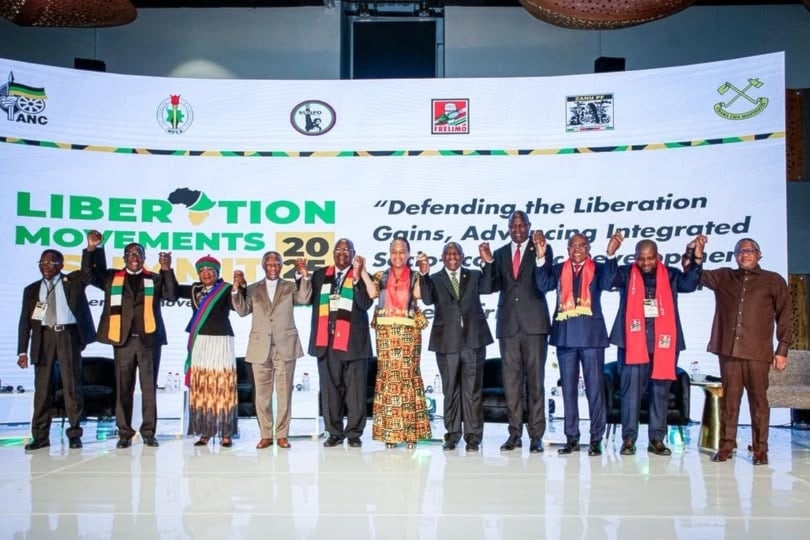West seeks to divide and conquer Africa: Liberation Movements Summit
Liberation movements meet in Johannesburg to resist neo-colonialism and Western interference and reaffirm African unity and sovereignty.
-

Delegates to the Liberation Movements Summit lift each other's hands during a group photo, Johannesburg, South Africa, July 28, 2025. (Social media)
Liberation movements representing six African nations have convened in Johannesburg, South Africa, to foster greater solidarity and resistance against Western interference, as they raise concerns about external forces seeking to create divisions among African countries and regain economic control over the continent.
Over the weekend, Kempton Park, Johannesburg, was the venue of a gathering involving several African heads of state whose former liberation movements have since become the ruling parties in their respective nations.
During the gathering, the leaders reflected on their historical contributions to liberation while reaffirming their commitment to continental unity, safeguarding democratic progress against neo-colonialism, and advancing development to elevate living standards across Africa.
Colonialist West seeks to divide Africa
Standing in solidarity, the parties, represented by their respective presidents, pledged to resist any attempts by colonial powers to regain dominance over the continent through economic sanctions or other coercive measures.
Reacting to the recent sanctions imposed by US President Donald Trump, Zimbabwean President Emmerson Mnangagwa stated that foreign powers have persistently pursued their agenda to eliminate liberation movements from the political landscape across the region.
“However, we must remain emboldened by our rich liberation history, which is our greatest teacher. The millions of people who look to liberation movements with hope for a better tomorrow should be a source of inspiration,” Mnangagwa said.
Mnangagwa emphasized that the liberation movement must harness the same determination and strength that overcame colonial rule to prevail once more, declaring with resolute conviction that just as they had triumphed before, they would continue to prevail repeatedly through unwavering unity and indestructible solidarity, which guarantees inevitable victory.
Anti-liberation elements seek to erode African independence
Namibian President and Swapo leader Netumbo Nandi-Ndaitwah warned that elements historically opposed to liberation continue operating through coordinated economic pressure, political manipulation, and diplomatic schemes in their persistent attempts to erode the achievements of Africa's independence movements.
Nandi-Ndaitwah stressed that these external forces continue pursuing divide-and-rule tactics while systematically plundering Africa's resources to enrich their own nations.
South African President Cyril Ramaphosa emphasized that liberation movements must never resign themselves to colonial domination as an inevitable destiny. Ramaphosa also acknowledged how the global struggle to eradicate apartheid, racism, colonial oppression, and systemic hatred had been significantly strengthened through worldwide support, including crucial backing from the OAU Liberation Committee alongside progressive diaspora communities and international allies who stood united at the vanguard of this movement.
Ramaphosa underscored to the assembled delegates that their historic battles extended far beyond the achievement of political sovereignty, encompassing instead a comprehensive emancipation that included economic self-determination, cultural revival, intellectual freedom, and complete social transformation.

 3 Min Read
3 Min Read










